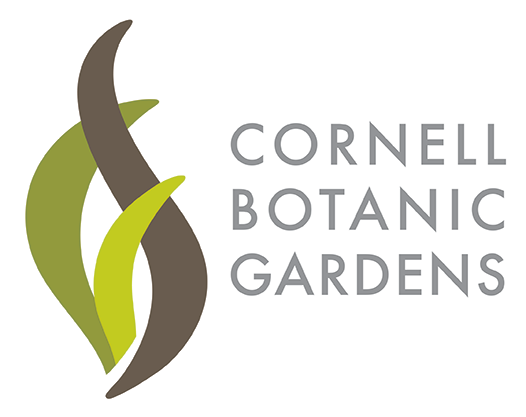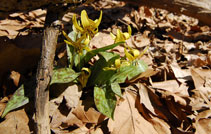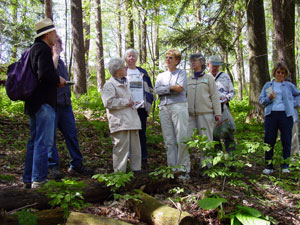News
Kids Discover the Trail! Announces New Website
Kids Discover the Trail!, a collaboration of the Ithaca Public Education Initiative (IPEI), the Discovery Trail (DT), and the Ithaca City School District (ICSD); is pleased to announce its new website KidsDiscovertheTrail.org. In addition to providing a program introduction, it links to a wiki web site highlighting “best practices” of school and museum educators involved with Kids Discover the Trail!.
Kids Discover the Trail! provides curriculum-based field trips to the eight sites of the Discovery Trail consisting of Cayuga Nature Center, Cornell Lab of Ornithology, Cornell Plantations, Herbert F. Johnson Museum of Art, The History Center in Tompkins County, Museum of the Earth at PRI, Sciencenter, and Tompkins County Public Library for ICSD students in grades Pre-K to 5. Classrooms from different ICSD elementary schools are partnered to increase opportunities for students and families from different neighborhoods to get to know each other.
This program is funded by gifts from local foundations, businesses and community members made to the IPEI; by gifts to the eight Discovery Trail organizations; and is supported by ICSD. This year’s overall Program Sponsor is BorgWarner Morse TEC.
"Kids Discover the Trail! represents the best of what Ithaca and Tompkins County have to offer our children - equity, diversity, and a chance to experience eight world-class cultural organizations right here at home, all during their formative elementary years." Charles Trautmann, Sciencenter Executive Director and Kids Discover the Trail! Co-chair.
For more information please email [email protected] or call (607) 256-4734.
April Sunshine Brings a Burst of Blooms
The bright sunny days and warmer temperatures of the past few weeks have some of our early spring bloomers putting on a show a bit early. Come enjoy the sunshine at Plantations!
You will find:
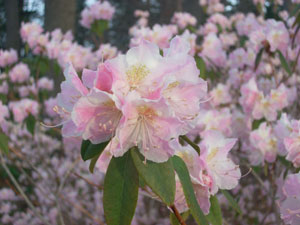
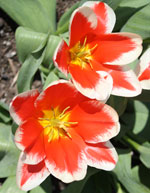
several tulips in bloom including Tulipa 'Pirand' in the Young Garden,
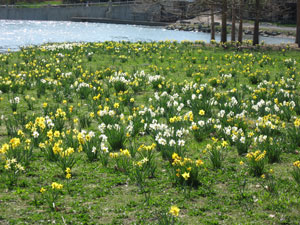
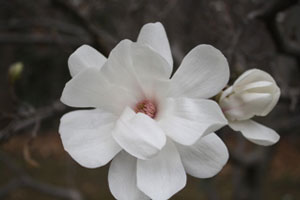
Magnolia x Loebneri 'Merrill,' one of several magnolias blooming in Jackson Grove in the
F.R. Newman Arboretum.
Spring is here and so is our spring class line-up!
One of the many signs of Spring at Cornell Plantations is the posting of our Spring and Summer classes and events. Spring highlights include botanical illustration classes and guided bird and wildflower walks. View our calendar here.
A new and exciting learning opportunity to get you outside this spring: The Natural Areas Academy
Do you love spending time in the forests, meadows and other natural areas in the Finger Lakes? Do you care about preserving the integrity of the natural world and want to share this love with others? If so, consider joining a new educational program at Cornell Plantations: The Natural Areas Academy.
The Natural Areas Academy is designed to offer an engaged educational experience through workshops, field trips, and hands on conservation projects. This experience will prepare participants for proactive and independent stewardship roles and to become mentors themselves.
Visit here to learn more and how you can get involved.
Cascadilla Gorge Trail Repairs Have Begun
Efforts are now underway to repair and eventually reopen the Cascadilla Gorge Trail, one of Ithaca’s and Cornell’s most cherished landscapes. Cascadilla Gorge has been closed for the past year due to unsafe conditions. Through funding provided by Cornell University, work has begun to replace hand rails, restore stairs, install fencing, and other identified safety hazards.
During construction, visitors are reminded that portions of the trail are extremely dangerous, and are strongly urged to observe the “Posted Trail Closed” signs.
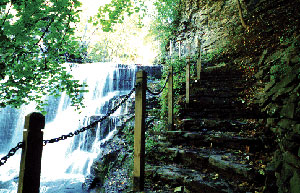
Cascadilla Gorge was originally preserved and donated to Cornell University by Robert H. Treman in 1909 to support public use, education, and enjoyment. The Cascadilla Gorge Trail system, initially constructed during the Civilian Conservation Corp. era, ascends 400 feet in elevation between Lynn Street and Hoy Road, and currently totals 7,800 feet in length. Cornell Plantations manages Cascadilla Gorge, and is committed to protecting the natural area, providing ongoing educational use, and supporting safe public recreation and enjoyment of the gorge.
Learn More about Sustainable Landscapes at the 2nd Annual Native Plant Symposium
Whether you are a homeowner, landscape designer, land manager, or horticulturalist, the 2nd Annual Designing with Native Plants Symposium will inspire the use of native plants to create more sustainable landscapes. There will be eleven talks over two days covering topics such as planting a green roof, plants for stormwater drainage, and impacts of climate change on native ecosystems. Cornell Plantations gardener Krissy Faust will provide practical advice on planting a no-mow or low-mow lawn based on her successes in planting a native lawn at the entrance of Plantations' Mundy Wildflower Garden.
When: Friday and Saturday, March 5ht and 6th
Where: Cornell Lab of Ornithology Johnson Center for Birds and Biodiversity in Ithaca, NY
Click here for symposium schedule and registration.
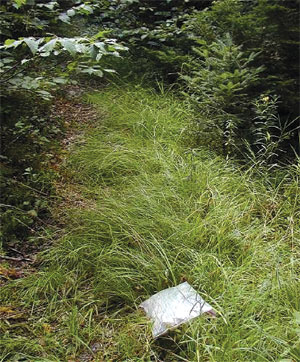
Danthonia compressa (above) is part of the palette of "no-mow" grasses featured in the Mundy Wildflower Garden.
Plantations’ Welcome Center is Growing!
In August, Cornell Plantations began construction on its new Brian C. Nevin Welcome Center. Over the last 7 months we have bee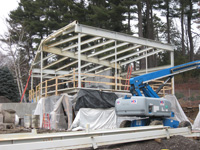 n posting updates and photos of our progress here. We invite you to visit online to see how the building is coming along and, if you’re in the area, stop by to see the work first-hand! As the weather begins to warm up, the building will rise faster and the surrounding landscape will take shape. Check back often to watch us grow!
n posting updates and photos of our progress here. We invite you to visit online to see how the building is coming along and, if you’re in the area, stop by to see the work first-hand! As the weather begins to warm up, the building will rise faster and the surrounding landscape will take shape. Check back often to watch us grow!
Natural Areas participating in study to try and save hemlocks
Cornell Plantations continues working towards the control of hemlock woolly adelgids by providing the use of our Natural Areas for research into more effective control. In October, 2009, researchers Mark Whitmore from Cornell University and Dave Mausel from the University of Massachusetts-Amherst introduced a biocontrol agent as part of a 10 year study sponsored by the US Forest Service. 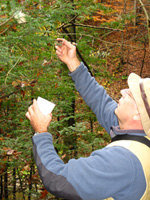 Three hundred individuals of Laricobius nigrinus, a predatory beetle native to the northwestern united states, were released to study the ability of a new inland biotype to successfully overwinter and feed on all life stages of hemlock wooly adelgids. To read more, see the Cornell Chronicle and the Ithaca Journal, for stories about the research. For more information on the hemlock woolly adelgid and Cornell Plantations' efforts, click here.
Three hundred individuals of Laricobius nigrinus, a predatory beetle native to the northwestern united states, were released to study the ability of a new inland biotype to successfully overwinter and feed on all life stages of hemlock wooly adelgids. To read more, see the Cornell Chronicle and the Ithaca Journal, for stories about the research. For more information on the hemlock woolly adelgid and Cornell Plantations' efforts, click here.
Pictured is Mark Whitmore depositing Laricobius nigrinus on a hemlock tree infested with hemlock wooly adelgids, Oct. 29, 2009. Photo by Todd Bittner
Cornell Plantations breaks ground on its welcome center
By Krishna Ramanujan
Originally published by the Cornell Chronicle.
At the back of a construction zone with backhoes and piles of dirt surrounded by a chain-link fence, a gray wall is built into Comstock Knoll. Next year, the site will house Cornell Plantations' new sustainably designed welcome center.

Robert Barker/University Photography
From left: John Kiefer, Glenn Dallas, Susan Henry and Don Rakow.
On a drizzly gray day, visitors were cheered Oct. 23 by a groundbreaking ceremony for the Cornell Plantations Brian C. Nevin Welcome Center at the Mullestein Winter garden, next to Plantations Road.
"Plantations has long needed a single site where we can greet visitors, provide them with orientation and interpretation about our history and collections, and meet visitor amenity needs," said Don Rakow, the Elizabeth Newman Wilds Director of Cornell Plantations, at the ceremony.
The building, planned for completion by Trustee/Council Weekend next October, will comply with the Leadership in Energy and Environmental Design (LEED) gold certification standards. The first floor will be bermed into Comstock Knoll in the heart of the botanical garden. The contractor is using partly reused materials and is recycling its construction waste. And the building will use 30 percent less energy than industry standards require and will include both a green roof and solar panels.
The center will feature a bright two-story atrium and lobby, interpretive exhibits about Cornell Plantations, a reception desk, restrooms, a gift shop and a small café. To better serve Plantations' education and outreach programs, the second floor will include a 100-seat classroom/lecture hall and a 10-seat conference room.
The new center is intended as the capstone project of a long series of capital improvements at Plantations that began a dozen years ago, said Rakow. In addition to the new center, upgrades will include a new parking area with a tour-bus drop-off zone, partly built with Cornell structural soil designed by Cornell's Urban Horticultural Institute to safely bear pavement loads after compaction and still allow root penetration and vigorous tree growth.
Also, a new "bioswale" adjacent to the parking lot will be designed to bio-remediate runoff from the parking area. "The Plantations is a model for all the world to look to for its sustainable gardening and land management practices, native plant conservation and habitat preservation and restoration," said Susan Henry, the Ronald P. Lynch Dean of Agriculture and Life Sciences, at the event.
Cornell Project, Design and Construction Director John Kiefer, who also spoke at the event, took part in the ceremonial groundbreaking with Henry, Rakow and Glenn Dallas '58 (representing Maddi Dallas '58, co-chair of the Plantations 21st Century Committee).
The welcome center is named for Brian Nevin '50, at the request of C. Sherwood Southwick, his partner and the new center's major donor. Nevin and Southwick co-owned Briarwood Antiques on State Street in Ithaca for 32 years.
Cascadilla Gorge Trail CLOSED due to hazardous conditions
September 18, 2009 - Emergency repairs will be commencing this week to replace damaged and hazardous infrastructure above the Cascadilla Gorge Trail. The public is reminded that the trail remains closed between Linn Street and College Avenue due to extreme safety hazards from ongoing construction work, overhead rock and debris, and unsafe trail conditions. We urge you to stay out of the gorge until the trail is reopened. Please don't jeopardize your own safety or the safety of others.
August 24, 2009- Please take notice that the Cascadilla Gorge Trail from Linn Street downtown to College Avenue is temporarily closed, effective immediately. The Cascadilla Gorge pathways and railings have been severely damaged from the forces of nature, and are presently unsafe. That section of the gorge trail will remain closed and extremely hazardous until repairs can be made.
Sod sofa created at Cornell Plantations
On Tuesday, September 8, Cornell students in Marcia Eames-Sheavly's "Art of Horticulture" class (HORT 2010) constructed a sod sofa in the F.R. Newman Arboretum. The project was jointly organized by Eames-Sheavly, turf specialist Frank Rossi and staff at Cornell Plantations. The sod sofa is open to the public and we invite all to come out to see and sit in it! Below is a video of the sod sofa being constructed, courtesy of Cornell Horticulture.
Fall Lecture Series kicks off Wednesday, September 2!
Cornell Plantations kicks off it's annual Fall Lecture series next Wednesday evening, September 2, with renowned Cornell English professor, Daniel Schwarz. Professor Schwarz will be giving the Harder lecture on Reconfiguring Nature after Darwin: Skepticism and Sexuality in High Modernist Literature. The lecture will begin at 5:30 in Warren Hall Auditorium and will be followed by Plantations' annual garden party.
Every other Wednesday from September 16 to November 11 Plantations will offer lectures at 7:30 in Statler Auditorium. For more details, speaker information, and lecture descriptions go here.
The lecture series may be taken for Cornell course credit as Hort 4800. For more information click here.
Newman's Own Foundation to support globeflower preservation
Cornell Plantations is pleased to announce that the Newman’s Own Foundation has awarded a grant to the Natural Areas Program to support our efforts to preserve the rare American globeflower (Trollius laxus).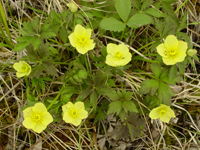 This globally imperiled plant is presently known from only about 50 sites. The globeflower has a limited range, spanning parts of New York, Ohio, Pennsylvania, New Jersey, and Connecticut. The majority of populations are found in New York, and 15 sites are in the Ithaca area within the Fall Creek watershed. Plantations’ Natural Areas Program protects two of the of the Fall Creek watershed populations, and conservation of this rare species is one of our top priorities.
This globally imperiled plant is presently known from only about 50 sites. The globeflower has a limited range, spanning parts of New York, Ohio, Pennsylvania, New Jersey, and Connecticut. The majority of populations are found in New York, and 15 sites are in the Ithaca area within the Fall Creek watershed. Plantations’ Natural Areas Program protects two of the of the Fall Creek watershed populations, and conservation of this rare species is one of our top priorities.
Newman’s Own Foundation is a private, independent foundation established by Paul L. Newman. The Foundation continues the commitment of Paul to donate all net profits and royalties earned from the sale of Newman’s Own products to charity. As of June 2009, over $267 million has been donated to thousands of charities around the world.
For more information, contact Beth Anderson, Plantations development director, at 607-254-4727 or [email protected].
The Robison Herb Garden is in Full Bloom!
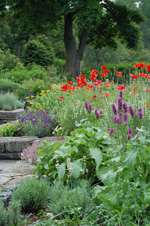 July 23, 2009- The Robison Herb Garden is a very special part of our Botanical Garden Collection. You can spend hours exploring plants that have enhanced our quality of life in many ways, and now is the ideal time to visit. The zinnias and marigolds of the garden's "dye herbs" bed shine with bright oranges, reds, and yellows. At the garden's entrance, you will be met by an array of purples and pinks in the "ornamental herbs" bed. These are two of the garden's seventeen beds of plants arranged by their uses and are labeled for you learn more about them.
July 23, 2009- The Robison Herb Garden is a very special part of our Botanical Garden Collection. You can spend hours exploring plants that have enhanced our quality of life in many ways, and now is the ideal time to visit. The zinnias and marigolds of the garden's "dye herbs" bed shine with bright oranges, reds, and yellows. At the garden's entrance, you will be met by an array of purples and pinks in the "ornamental herbs" bed. These are two of the garden's seventeen beds of plants arranged by their uses and are labeled for you learn more about them.
Flowers After Hours
July 16, 2009. Lengthening shadows, night-blooming flowers, nocturnal pollinators and diminished traffic noise can make the garden a place of special evening beauty. Join us for a relaxing stroll through the botanical garden and enjoy the quiet serenity of the garden at day’s end. Learn which flowers are at their best after hours, and why their color, foliage or fragrance makes them desirable for the evening garden. Tour lasts approximately one hour. Please dress for the weather and wear comfortable walking shoes.
Wednesday, July 29 and Wednesday, August 19, at 7:00 p.m.
Presented in cooperation with the Cancer Resource Center of the Finger Lakes.
Instructor:Kevin Moss, Cornell Plantations staff
Fee: Free
Location: Meet on the patio outside the Garden Gift Shop at Cornell Plantations
For more information, please call (607) 255-2400, or 254-7430.
Plantations' Director Responds to Plant Thefts
ITHACA, NY July 1, 2009 Since the publication of stories in the Ithaca Journal and other media about recent plant thefts at Cornell Plantations, we have received an outpouring of support from the community, as well as from Cornell alumni and gardening enthusiasts across the nation.
While each visitor to Plantations has a unique experience, we hope that all of them leave with an appreciation for the beauty of our gardens and natural areas, and a renewed sense of peace and calm inspired by reconnecting with nature. But creating and caring for the unique botanical collections that comprise Plantations is far from a tranquil process. Our gardeners deal on a daily basis with a range of challenges presented by nature itself—from the weather, to voracious deer and other herbivores, to an ever-increasing array of invasive species, destructive insects and diseases.
But the threat that we face from marauding plant thieves is uniquely disturbing, in terms of both the impact on our gardens and on the morale of our staff. As a gate-less public garden, how do we protect the living treasures in our collections?
A few weeks back, a flat of heritage tomato seedlings disappeared in the dark of night. Before that, we lost a dwarf agave, an Asian skunk cabbage, a Japanese wood poppy, and the list goes on. Potted plants have been stolen shortly after we purchased them, while others have been dug out of the landscape. Because these are not commonly recognized or available species, I believe that we are dealing with sophisticated, knowledgeable plant robbers.
Why would someone steal plants from Plantations? Perhaps the thieves are selling them, or hiding them in their own gardens. Last week one of our gardeners overheard two passers-by talking about the recent thefts. One of them said, “If I only had 15 minutes and a shovel…,” insinuating that she wouldn’t hesitate to take whatever she wanted.
While this may have been a joke, it seems to show that many people don’t recognize that the
specimens in our gardens are the equivalent of objects in a museum gallery. It’s no more acceptable to take a shrub from Plantations than it would be to steal a book from the public library or a sculpture from The Commons. Just as a library collects books so that they can be enjoyed by hundreds of readers, Plantations collects plants so that people of all ages and from all walks of life have a place to come to study, discover, and delight in nature.
Cornell Plantations is proud of to be the primary public garden of the Finger Lakes region. Our grounds are open to visitors every day, from dawn to dusk, with never an entry fee. Close to 85 percent of our operating budget is provided by gifts from our members and friends, and income from endowments established by generous alumni and other donors. The plants in our collections are nurtured by our professional staff, and a corps of 100 volunteers helps to tend the gardens, preserve our natural areas, and offer public programs.
Plantations is your community garden. We encourage and welcome visitors—regardless of whether you are an experienced master gardener, or a six-year-old just discovering the world of plants. Come and revel in the riot of color and scent in the gardens, jog or walk your dog in the arboretum, hike the trails through our natural areas, be entertained at our summer Shakespeare performances, and bring your family to our Judy’s Day festival this fall.
All we ask of the public is that visitors act respectfully toward one another, and that our grounds and plants are left intact for all to enjoy.
Donald A. Rakow
The E.N. Wilds Director, Cornell Plantations
Associate Professor of Landscape Horticulture, Cornell University
Cornell Plantations plagued by sophisticated plant thieves: valuable collections are being decimated by thefts
ITHACA, N.Y. June 10, 2009 — Rare and highly valued plants are being stolen from the Cornell University Plantations at an alarming rate, and such thefts are disrupting the Plantation’s educational mission, destroying research, and robb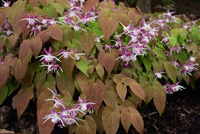 ing visitors of the ability to see the entire plant collection.
ing visitors of the ability to see the entire plant collection.
“These thefts have a ripple effect. They rob faculty and students of the teaching value of these collections, they demoralize our dedicated gardening staff, and destroy valuable research,” said Donald Rakow, Cornell Plantations director. “Many of these plants are irreplaceable. Taking such plants is just like stealing priceless exhibits from a major museum.”
Plant thefts at the Plantations have always been a problem, but during the past two years such thefts have occurred more often, and there are indications that the thieves are becoming very knowledgeable. “The plants taken are always rare or unusual, indicating that experienced gardeners are keeping an eye on the Plantations and identifying plants they are interested in stealing,” said Mary Hirshfeld, director of horticulture at the Plantations. Such high-value thefts include a rare, slow-growing, potted specimen-sized Agave 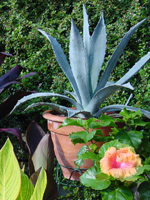 and a heavy, glazed container with colorful annuals and perennials that was stolen right in front of the Plantations administration building. In perhaps the most brazen theft, the herb garden manager was laying out perennials in peat pots throughout the garden in preparation for planting. She took a short break, only to return to find that many of the plants were stolen. Most recently, more than $900 in unusual heirloom vegetable plants were taken from their cold frames located outside the Plantation’s vegetable garden.
and a heavy, glazed container with colorful annuals and perennials that was stolen right in front of the Plantations administration building. In perhaps the most brazen theft, the herb garden manager was laying out perennials in peat pots throughout the garden in preparation for planting. She took a short break, only to return to find that many of the plants were stolen. Most recently, more than $900 in unusual heirloom vegetable plants were taken from their cold frames located outside the Plantation’s vegetable garden.
Management of the Cornell Plantations is urging visitors to help them by reporting any suspicious or unusual behavior by other people in the plantations by calling the Cornell University Police Department at 607-255-1111.
To listen to a news report with Plantations director, Don Rakow, click here ("Cornell Plant Thefts, June 11, 2009").
Stolen plants include:
Lysichiton camtschatense (Asian skunk cabbage), 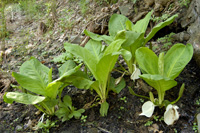
Glaucidium palmatum (Japanese wood poppy)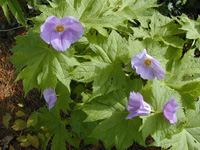
epimediums (Bishop's cap) pictured above top
Saruma henryi, (Asian woodlander)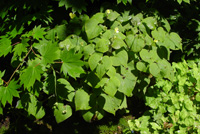
Container planting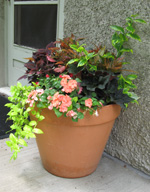
Heirloom tomato varieties:
Aunt Ruby’s German Green
Big Rainbow
Black from Tula
Cream Sausage
Giant Oxheart
Hillbilly Potato Leaf
Plum Lemon
Orange Fleshed Smudge
Wapsipinicon Peach
Hemlock Woolly Adelgid Monitoring Survey: What Did we Find?
May 27, 2009- Cornell Plantations, in partnership with the Cornell Department of Natural Resources, Finger Lakes Land Trust, Finger Lakes Native Plant Society, Cayuga Trails Club, and numerous volunteers, recently completed a monitoring campaign to detect new hemlock woolly adelgid populations in the Ithaca area.
Over 120 volunteers attended three seminars where they were trained to identify and report new infestations. With the support of 28 adjoining private property owners, Plantations’ Natural Areas Program coordinated volunteer surveys in 10 hemlock forest natural areas in proximity to previously known hemlock woolly adelgid occurrences. In total, volunteers spent nearly 250 hours and surveyed 568 acres. Volunteers also logged their survey locations and findings on the New York Invasive Species Research Institute database to share this valuable information with other conservation agencies and scientists.
The hemlock woolly adelgid (Adelges tsugae) causes nearly 100 percent mortality in the local, native eastern hemlock (Tsuga canadensis). This invasive species has decimated hemlock populations across the eastern United States.
The good news resulting from the surveys is that hemlock woolly adelgids are not widely dispersed within local hemlock forests at present. One new light infestation was documented within Plantations’ Edwards Lake Cliffs Natural Area. Early detection and containment is a critical element in any invasive species control effort. To view summary of findings, click here.
View map of Hemlock Woolly Adelgid detection efforts in the Central Finger Lakes Region (updated May, 2009).
Cascadilla Gorge Trail Will Remain Closed
May 27, 2009- Please take notice that the Cascadilla Gorge Trail from Linn Street downtown to College Avenue is temporarily closed, effective immediately. The Cascadilla Gorge pathways and railings have been severely damaged from the forces of nature, and are presentl unsafe. That section of the gorge trail will remain closed until repairs can be made.
Bird Walks in the Arboretum
May 1, 2009 ITHACA, N.Y. – In an effort to raise awareness about local ecology for both flora and fauna, Cornell Plantations has teamed up with the Cornell Lab of Ornithology for ‘Bird Walks in the Arboretum.’ Expert-guided bird tours of the Cornell Plantations Newman Arboretum will take place at 8:00A.M. every Friday in May. Parking is available at the Caldwell Road parking lot across the street from the Arboretum, and pre-registration is not required.
For more information, click here.



